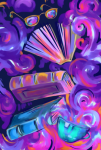The summer is finally in full swing, meaning there’s also more time to engage in an activity often overlooked by busy students during the school year: picking up a good book or two.
However, in our increasingly social-media dense world, what are college students actually reading for fun besides tweets, Snapchat captions and a few Google news alerts here and there?
Student schedules are often jampacked with classes, jobs, internships, extracurriculars and social commitments during the school year. So much so, in fact, that it causes sleep deprivation at twice the rate of the general populace.
This begs the question – do increasingly busy Bruins even have time to read anything longer than an Instagram post or news article?
At first glance, the numbers don’t look great. There’s recently been a precipitous drop in library books checked out on college campuses. One might think reading has fallen by the wayside as there are so many other activities occupying a college student’s time.
As it turns out, however, fewer Americans overall are reading print books these days, which makes sense in the context of the variety of digital entertainment options available in 2019. In fact, adults aged 18-29 are still reading, on average, more than older age groups.
Somehow young adults are managing to squeeze in more time for reading than others, but we’re more interested in when and what they’re reading. We’ve talked to students about their typical reading patterns and their favorite novels to flip through both in the summer and year-round.
Rising fourth-year geophysics student Laura Iglesias said she hardly ever gets the chance to read a book during the academic year.
“The only reading I typically do during the year is assigned readings,” Iglesias said. “I can’t remember the last book I read on my own during the school year.”
Iglesias said that when she does get around to reading in the summertime, it’s for entertainment. Iglesias’ favorite book is “Good Omens” by Neil Gaiman and Terry Pratchett.
“’Good Omens’ is about the coming of Armageddon,” Iglesias said. “The Antichrist is born but an angel and a demon conspire to make the Antichrist morally neutral so that the apocalypse won’t start. It’s a really funny book.”
Some students, like rising third-year mathematics of computation student Daniel Levi-Minzi, said they try to read during the year as a means of de-stressing from the pressure of classes.
Levi-Minzi said he reads a wide range of fantasy and science fiction novels and recommends the “Dune” saga by Frank Herbert.
“It’s like ‘Game of Thrones’ but in space and actually a complete story,” Levi-Minzi said. “There is even a ‘Dune’ movie coming out next year.”
While Snapchat stories offer quick looks into other people’s seemingly exciting and spontaneous lives, fantasy and science fiction novels have long acted as an effective means of escape – with the added benefit of not having to worry about whether what you’re viewing is just a loose representation of reality.
Other students make efforts to ensure their time spent reading doesn’t dwindle during the busy school year.
Tara Ostad, a rising fourth-year physiological science student, said she tries to read at least one book a month during the school year, but ultimately ends up reading more during the summer.
Ostad’s sentiments were echoed by rising fourth-year chemistry student Stella Fors.
“I wish I could read more during the year,” Fors said. “Reading is calming for me. It is externalizing in the sense that you don’t have to worry about your life and you get absorbed into the book.”
Fors said the last book she read was “Killers of the Flower Moon: The Osage Murders and the Birth of the FBI” by David Grann.
The nonfiction book investigates a series of murders of Osage tribe members in the 1920s in Osage County, Oklahoma after large oil deposits were found in the area. Fors said she learned a lot from the book and it made her consider a topic she had known nothing about previously.
Other students admit they don’t read many books at all.
Jony Balk, a rising fourth-year aerospace engineering student, said he typically reads a lot of scientific and news articles, but doesn’t pick up too many books. However, he did recommend “Wild: From Lost to Found on the Pacific Crest Trail” by Cheryl Strayed.
The 2012 memoir details Strayed’s 1,100 mile hike on the Pacific Crest Trail and was adapted into a movie in 2014.
Balk said he learned a lot from Strayed’s account and that the book inspired him to hike and enjoy the outdoors more.
Harel Amsalem, a rising third-year molecular, cell and developmental biology student, was similarly inspired after reading “When Breath Becomes Air” by Paul Kalanithi.
The nonfiction autobiography is about Kalanithi’s battle with lung cancer during his last year of neurosurgical residency at Stanford University.
Amsalem said “When Breath Becomes Air” is the reason he wants to attend medical school after he graduates and eventually become a doctor.
“I like to read books that have been proven to be important to people,” Amsalem said. “This book changed my life.”
The takeaways from reading books during the summer include more than just being plunged into a fantastical world or picking up a few new vocabulary words. Ditching Facebook and picking up a book can unleash more entertainment, knowledge or inspiration than reading a simple social media post – and it may just prove more rewarding.
